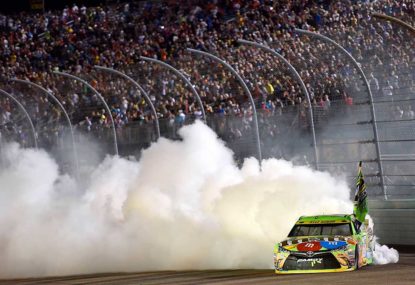Fernando Alonso's future is secure, now it's Lance Stroll's time to deliver for Aston Martin
It’s time that serious questions are asked of his Lance Stroll and his future in the team.

Only in NASCAR could a driver miss the first 11 races of the season, just under one third of the campaign, and still return to win the championship.
Kyle Busch did so last weekend, taking out the final race of the season to win the championship decider in Miami.
NASCAR enjoyed strong ratings and hailed the triumphant return of Busch from a broken leg and foot to champion. But at what cost for the actual sporting contest?
The Chase works in a similar fashion to most other American sports, though is adapted for the peculiarities of racing. Drivers earn qualification into the Chase with wins during the 26 races. In the Chase, drivers are eliminated from title contention over four stages, until just four drivers remain for a winner-takes-all finale.
In the NASCAR world, where entertainment is the name of the game and keeping the championship alive with a guaranteed showdown is essential, the Chase is now an accepted practice.
But how can a driver be crowned champion when they miss such a large chunk of the season? Joey Logano, the pacesetter for much of the year, finished in the top ten 28 times over the 36 races compared to Busch’s 15 top tens, yet Logano couldn’t contend for the championship at the season finale after being taken out in an earlier Chase stage.
While it undoubtedly ramps up the excitement in the latter rounds, it definitely had an impact on the excitement levels of the regular season, where drivers know a win at some point will earn them progression into the Chase. So why push each round when all that matters is qualification for the Chase and then the playoff at the end of the season?
The Chase creates this distortion and rewards form at a particular point of the season, rather than a whole campaign. Therefore, crowning a deserving champion often doesn’t happen. While it works for ball sports that are based on head-to-head team battles, it’s hard for motorsport to replicate that formula when the Chase contenders must do combat with out-of-the-running rivals.
Logano found this out the hard way at Martinsville, where his Chase hopes were shot after he was wrecked by rival Matt Kenseth. NASCAR’s culture of drivers taking revenge into their own hands doesn’t help validate a Chase system, where the best drivers over the course of the season can be knocked out through no fault of their own at the critical Chase stages.
It’s unsurprising, therefore, that ratings and crowd numbers for the NASCAR regular season are in free fall while the Chase results in an inevitable resurgence.
Those who point to the Chase as a potential template for changes to the V8 Supercars championship need to remember the manufactured playoff format comes at the cost of sporting traditions.
When fans are left to question the integrity of the championship and deservingness of the champion, the system is flawed.
The V8 Supercars’ upcoming championship finale may not have the drama of NASCAR’s, with Mark Winterbottom enjoying a healthy points buffer over Craig Lowndes, but at least a deserving champion will be crowned based on a season’s worth of racing.